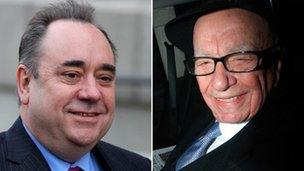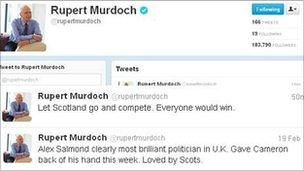Opinion matters in independence debate
- Published

Alex Salmond has won the plaudits of media tycoon Rupert Murdoch
Timing is all. A wee while back Alex Salmond might have offered an enthusiastic welcome to Rupert Murdoch's tweeted support for independence.
He might have recalled Mr Murdoch's Scottish ancestry - and his apparent distrust of the British Establishment.
But right now? In the middle of the Leveson inquiry into media ethics, external? An inquiry initially prompted by complaints about phone hacking at the now defunct News of the World (prop, R. Murdoch)?
Right now, Mr Salmond's response was notably constrained, welcoming "all contributions to the debate, including Mr Murdoch's".
Mr Salmond's rivals were rather more forthcoming. Willie Rennie of the Liberal Democrats said it was the endorsement every politician dreads.
Does any of this matter? Start with fundamentals. Media coverage will matter in the referendum contest. Newspaper endorsements will matter, particularly if they influence coverage more generally beyond the leader columns and Op Ed pages.
Mr Murdoch's opinion will matter, should it be translated into favourable treatment for the independence cause in his company's titles (as a counter-weight to the negative coverage which can be expected in other quarters.)
But right now both political sides in the emerging contest, Nationalist and Unionist, are seeking to define the other lot in negative terms of their own choosing.
Voter choices
The Unionists calculate that Rupert Murdoch is a negative asset, right now. Judge the independence cause, they may seek to imply, by the company it attracts.
Labour has already noted mischievously that Mr Salmond can presumably rely upon support from Tommy Sheridan. All that would be needed to complete their joy would be for Fred Goodwin to step forward and yell "Freedom".
Equally, the Nationalists are out to argue right now that support for the Union is tantamount to backing the UK government position and the Prime Minister. The choice, they will seek to imply, is between independence and the Tories - a party rejected by the Scots with remarkable consistency.
The same is true when it comes to defining the offers which will eventually be put before the electorate.
Supporters of the Union challenge Mr Salmond to produce much more detail on the nature of independence. Within the Scottish government, effort is under way right now to draft a Prospectus which will form the basis of the description of independence for the referendum.

Rupert Murdoch began tweeting at the beginning of the year
To be clear, Mr Salmond remains open to featuring an alternative - Devo Max - in that prospectus.
To be clear further, the independence content of the prospectus, once drafted and published, would be promulgated by a distinct political campaign team. Not by the machinery of government.
And so the Unionist camp presses for detail. Ditto the Nationalists. What, they say, are we to read into the offer by the Prime Minister to contemplate further powers for Scotland if and when independence is rejected?
More, presumably, than the current Scotland Bill, external despite the efforts by Ruth Davidson, the party's Scottish leader, to maintain her "line in the sand" in her interview on Newsnight Scotland. More tax powers? A bigger role in Europe? What?
This leaves Nationalists to argue that Scotland will know what a Yes vote in a referendum means. It would mean independence as defined in the prospectus. But what, they ask, would a No vote mean? What would it bring, beyond a rejection of independence?
Better plan?
This has led some to make a comparison with Alec Douglas-Home's intervention in the 1979 devolution Referendum when he urged Scots to vote No for a better plan under the Tories (which, of course, did not subsequently emerge.)
However, it all reminds me also of the period in the late 1980s and early 1990s when Labour and the Liberal Democrats said "No, but…." to demands for independence.
Unable to secure devolution at Westminster, they drafted detailed proposals in the Convention and pursued other campaigning avenues which were largely designed to give the impression of action in the face of obstacles.
I believe that a "No but…." stance is now plainly emerging from the SNP's three main rivals. The Lib Dems are already there with their commission under Sir Menzies Campbell. Labour are getting there with thoughtful speeches from Douglas Alexander and others, together with analysis from the party's Scottish leader, Johann Lamont.
The import of the PM's contribution is that a "No but…." approach is now under serious scrutiny in Downing Street.